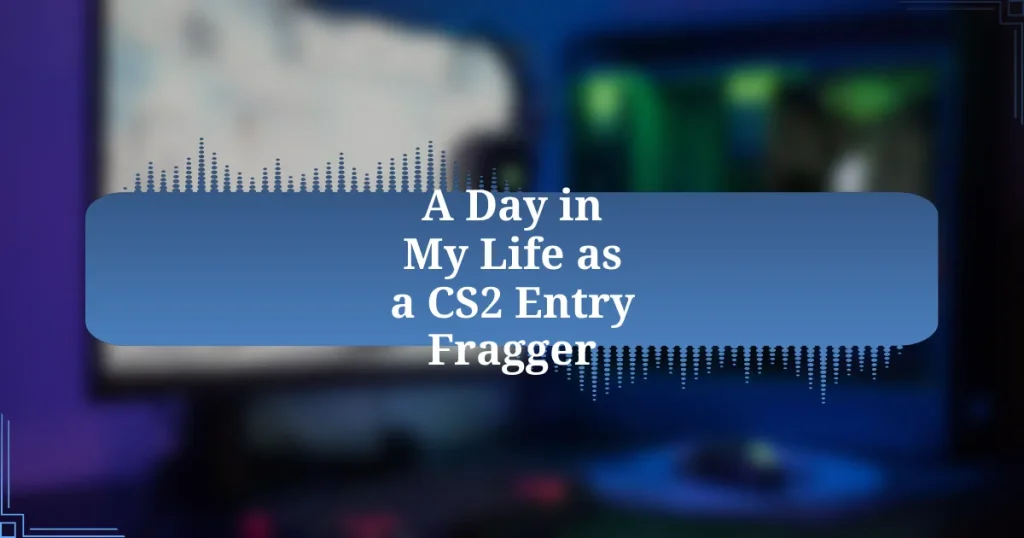Key takeaways:
- Counter Strike 2 is a reimagining of the classic tactical shooter, focusing on teamwork, strategy, and player communication.
- The role of an entry fragger involves initiating engagements with aggression, sharp shooting, and effective communication to create space for the team.
- Essential skills for entry fraggers include crosshair placement, game awareness, adaptability, and practice with grenades to improve gameplay.
- Personal insights reveal the emotional challenges of the role, the importance of trust in instincts, and the value of connecting with teammates to enhance performance.
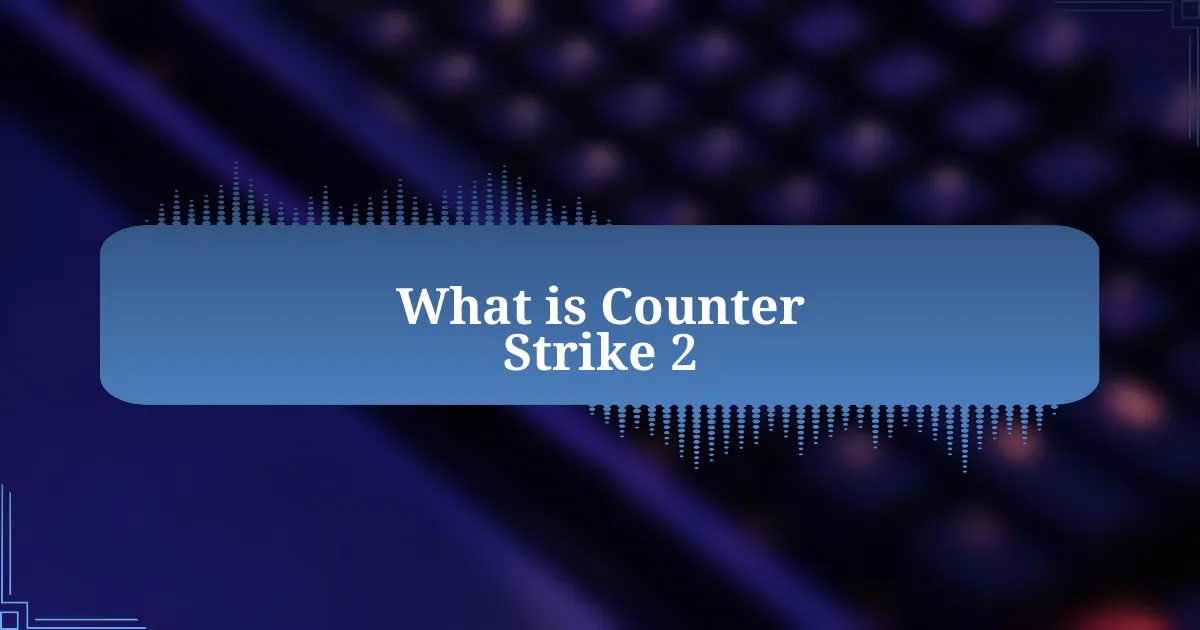
What is Counter Strike 2
Counter Strike 2 is a tactical first-person shooter that builds upon the legacy of its predecessors, offering players refined mechanics and updated graphics. I remember my first few matches in this game, feeling the adrenaline surge as I teamed up with friends to strategize and outmaneuver opponents. The thrill of coordinating with teammates never gets old.
With a focus on teamwork and strategy, CS2 emphasizes the importance of communication and skillful play. Have you ever been in a situation where a well-timed flashbang turned the tide of a round? Those moments resonate with me—highlighting the balance between individual prowess and collective effort.
The game is not just an update; it’s a reimagining, bringing new life to a classic. I can’t help but feel excited about the maps, the enhanced sound design, and the new mechanics that force players to adapt and evolve. Counter Strike 2 isn’t just another game; it’s a vibrant community that challenges individuals to push their limits.
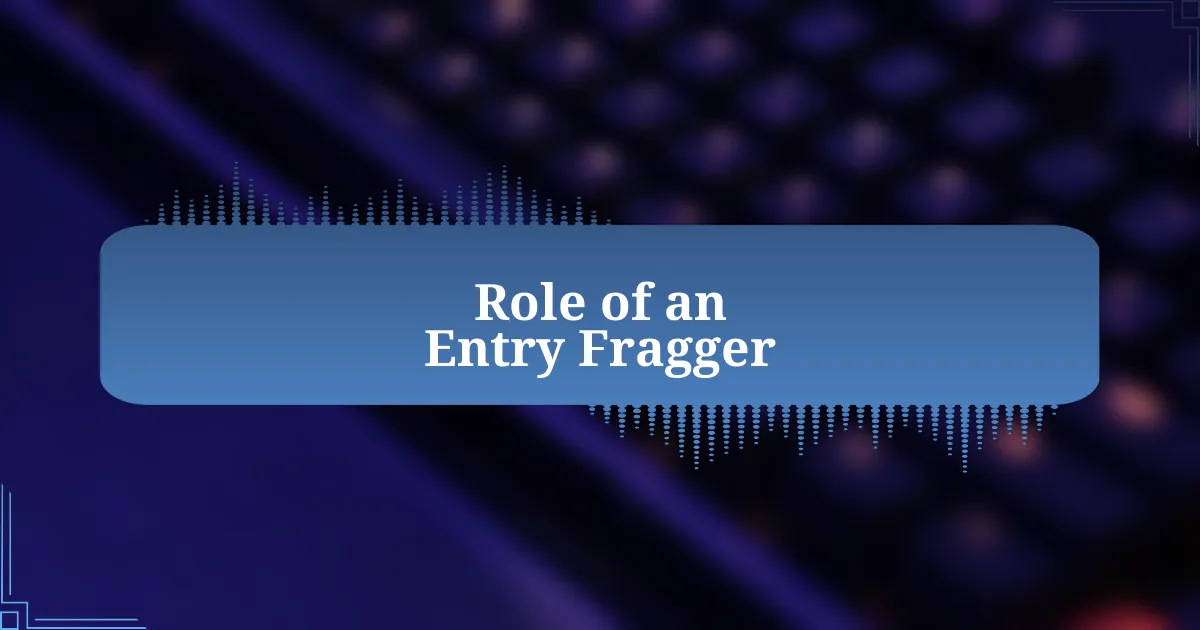
Role of an Entry Fragger
An entry fragger is often the spearhead of the team, initiating engagements with a high degree of aggression. I’ve found that the role requires not just sharp shooting skills but also a keen sense of timing and positioning. Have you ever felt that rush of adrenaline when you’re the first to push a bomb site? It’s a blend of anticipation and responsibility since your performance sets the tone for the rest of the round.
As the entry fragger, my job is to create space for my teammates by eliminating the first line of defense. This means I need to make split-second decisions about whether to rush in or play it safe, which can be nerve-wracking. I vividly remember a particular match where I single-handedly took out two opponents, allowing my team to secure a critical site. That moment reinforced my belief in the power of a well-executed entry frag.
In addition to fragging, effective communication with my team is vital. I often shout out callouts to alert my teammates about enemy positions while making my move. It’s a delicate dance—balancing aggression with strategic planning—to ensure we capitalize on the moment. When the entire team rallies behind a successful entry, it creates an exhilarating sense of camaraderie that I cherish.
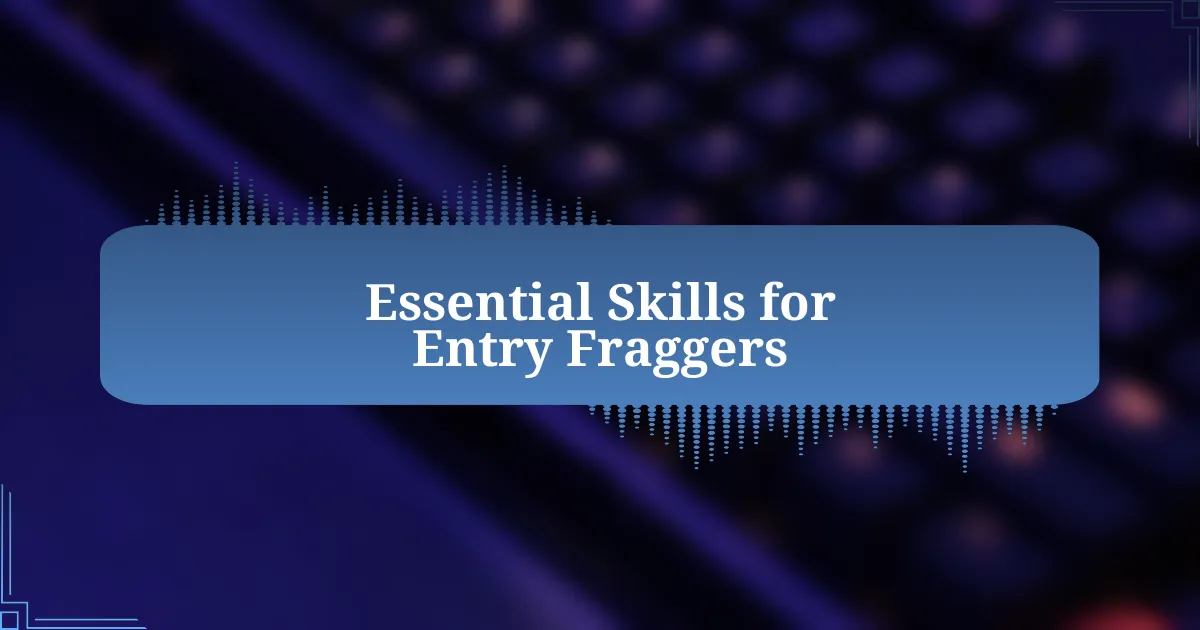
Essential Skills for Entry Fraggers
Understanding the dynamics of crosshair placement is crucial for any entry fragger. I remember the first time I really focused on this aspect; adjusting my crosshair to be at head level transformed my gameplay. Have you ever noticed how a slight tweak can dramatically improve your chances of landing that crucial first shot?
Another essential skill is the ability to read the game situation. I often find myself assessing enemy positions and predicting their movements before I even make my move. This instinct comes from countless hours of play and analyzing past matches. It’s like being a chess player, always thinking two or three steps ahead. When I successfully anticipate an enemy’s location, it feels exhilarating to capitalize on that knowledge.
Lastly, adaptability is vital in this role. The landscape of a round can shift in a heartbeat, and I’ve learned to adjust my playstyle accordingly. Whether it’s switching between aggressive pushes or playing defensive, I find that my ability to pivot has often turned the tide in tense situations. Can you recall the last time you had to change your strategy on the fly? Those moments not only test your skills but also hone your instincts as a player.
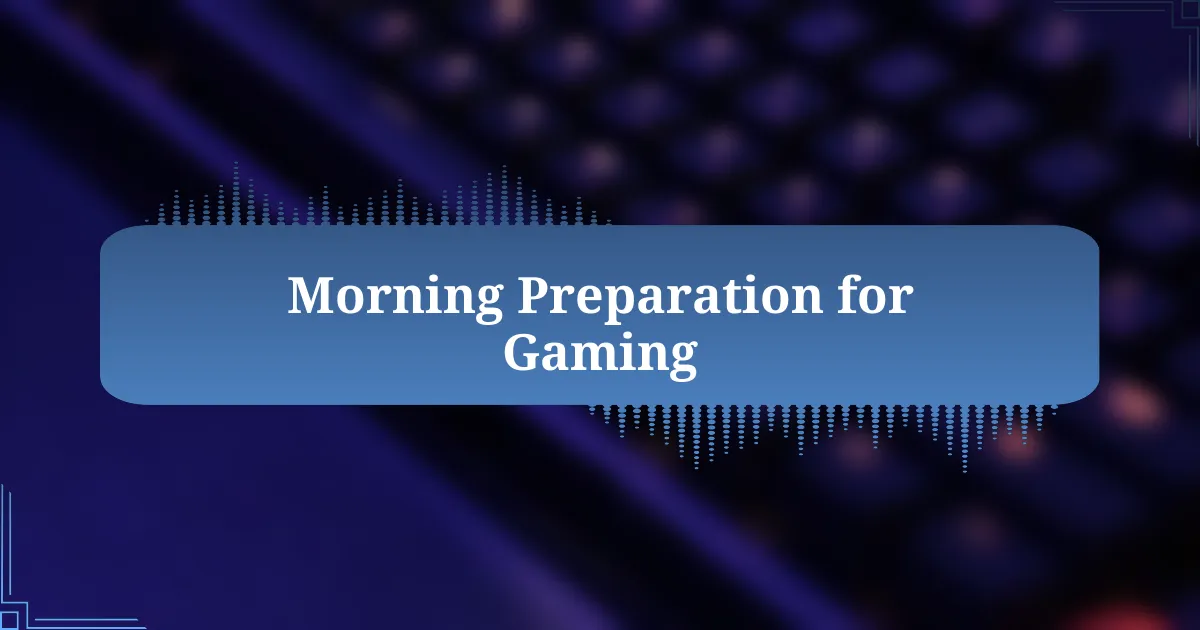
Morning Preparation for Gaming
Before diving into my gaming session, I have a specific morning routine that sets the tone for my day. I like to wake up early, allowing time for a good breakfast. There’s something about fueling my body with healthy food, like eggs and toast, that just feels right. Have you ever noticed how the right breakfast can boost your focus and energy levels?
Once I’m done eating, I turn to stretching and light exercise. This might sound unconventional, but trust me, it works wonders. I find that a few minutes of stretching helps clear my mind and keeps my reflexes sharp. After all, being an entry fragger requires both mental acuity and physical readiness; you wouldn’t want to be caught sluggish at the start of a round, right?
Finally, I spend a little time warming up in deathmatch mode. It’s like a ritual for me—it allows me to fine-tune my aim and get into the right headspace. Each session feels personal, almost like a conversation with my weapon, as I get reacquainted with its quirks. This warm-up phase is essential; it’s where I feel the adrenaline kick in, igniting that competitive fire before I dive into serious matches.
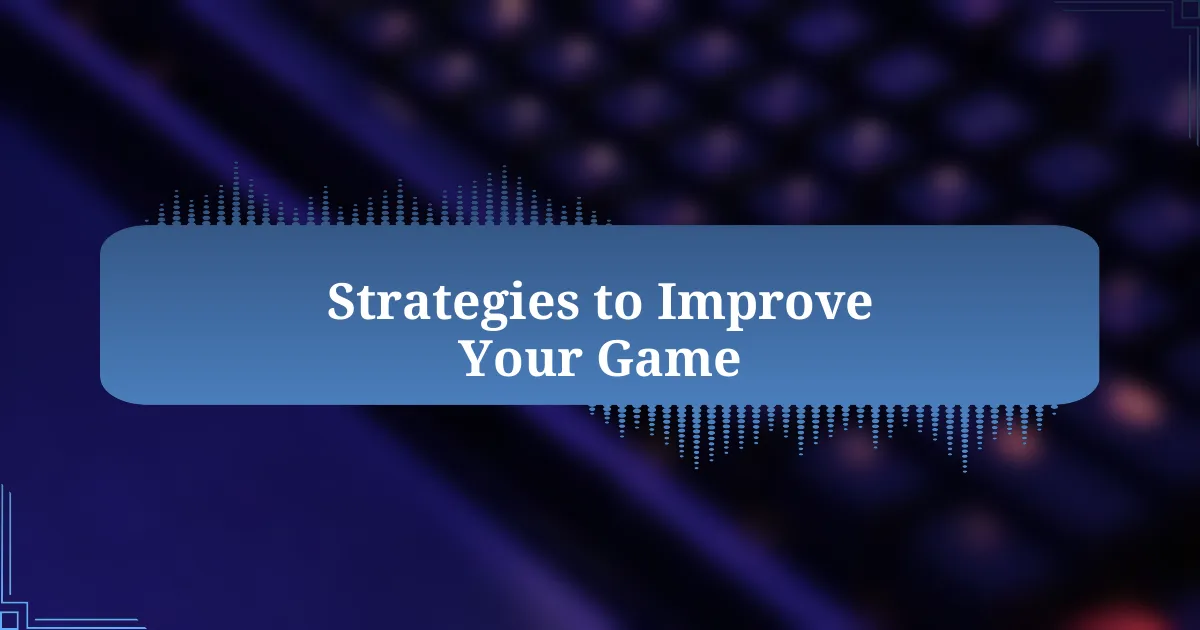
Strategies to Improve Your Game
When it comes to improving my game, I always emphasize communication with my team. Without clear calls and information sharing, it’s easy to get lost in the chaos of battle. I remember one match where we completely turned the tide simply because I reminded my teammates to share enemy locations. It was almost magical—suddenly, we were moving as one cohesive unit, and the victories followed.
Another vital strategy is reviewing my gameplay. I find it incredibly useful to analyze recorded matches, looking for mistakes in my positioning and decision-making. There was this one instance where I realized I was always peeking the same angle without any cover, leading to unnecessary deaths. By changing my approach, I saw a noticeable improvement in my survivability during rounds, which directly boosted my confidence.
Lastly, I can’t stress enough the importance of practice with grenades. Learning the trajectory of each grenade and timing can dramatically shift the game’s momentum. I often spend a solid hour in custom maps, experimenting with different throw techniques and spots. It might seem tedious, but the satisfaction of landing that perfect flashbang on an unsuspecting enemy is worth every second spent. Have you ever had that moment where your preparation pays off in a big way? For me, it’s when I know that all that practice translates into a game-changing play.

Personal Insights from My Experience
As an entry fragger, I’ve learned that the thrill of being at the forefront of the action can be both exhilarating and nerve-wracking. I remember a particularly intense round where I charged into A-site against two opponents. My heart raced, but I took a deep breath and focused on my aim, securing both kills. That moment reinforced for me the importance of trusting my instincts—sometimes, you just have to go for it.
One thing that consistently surprises me is how emotionally draining this role can be. There are matches where I feel invincible, and others where I struggle to find my groove. After a rough game, I often take a moment to reflect on what went wrong and how it affected my mindset. Realizing that it’s all part of the journey keeps me grounded. Have you ever had one of those days where nothing seems to go right? I know I have, and it reminds me that resilience is just as crucial as skill.
Connecting with my teammates is another insight I’ve gained through my experience. I’ve noticed that when I genuinely share my thoughts and feelings about our performance—good or bad—it creates a stronger bond. I recall a time when I voiced my frustration after a tough loss, and instead of pushing us apart, it opened the door for a candid discussion about our strategies. It’s those conversations that have forged a sense of camaraderie and ultimately improved our game as a team. How do you approach sharing experiences with your squad? For me, it’s been a game-changer.











